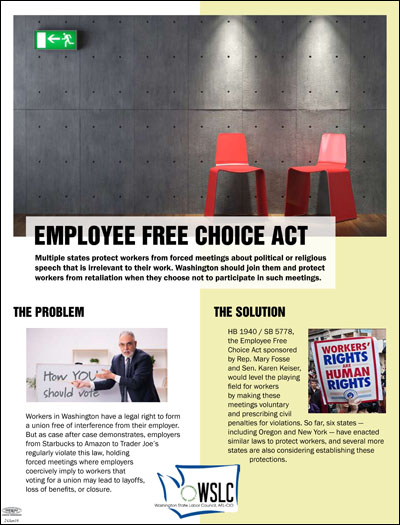STATE GOVERNMENT
Employee Free Choice Act passes State Senate
Sen. Keiser’s SB 5778 would protect workers who opt out of ‘captive audience’ meetings
OLYMPIA (Feb. 8, 2024) — Workers would gain protection against employers who seek to force them to attend meetings where they are required to listen to the employer’s opinions on religious or political matters, under legislation passed 28-20 by the Senate on Wednesday.
SB 5778, the Employee Free Choice Act, would make Washington the sixth state in the nation to prohibit employers from disciplining or firing employees who refuse to attend such “captive audience” meetings.
 “Workers are hired to do a job. Going to work should not obligate a worker to listen to their employer’s views on religious and political matters,” said Sen. Karen Keiser (D-Des Moines), chair of the Senate Labor & Commerce Committee and prime sponsor of the bill.
“Workers are hired to do a job. Going to work should not obligate a worker to listen to their employer’s views on religious and political matters,” said Sen. Karen Keiser (D-Des Moines), chair of the Senate Labor & Commerce Committee and prime sponsor of the bill.
Employers should not be able to force workers to attend political rallies promoting national political candidates, she said, or to listen to anti-trans speakers, citing examples of inappropriate meetings. Under the bill, employers would also not be able to require workers to attend meetings where they are told that that attempts to unionize will lead to layoffs or loss of benefits.
Oregon, Connecticut, Minnesota, Maine and New York have passed similar laws.
An amendment adopted on the floor ensures that the legislation does not prevent employers from requiring attendance at training to reduce and prevent workplace harassment or discrimination.
“Nothing in this bill infringes on an employer’s ability to say what they want to say,” said Keiser. “The bill simply protects the rights of workers by making religious or political meetings voluntary.”
The bill now moves to the House for consideration.
 SB 5778 is among the priority legislation in the Washington State Labor Council’s 2024 Legislative Agenda.
SB 5778 is among the priority legislation in the Washington State Labor Council’s 2024 Legislative Agenda.
Here are some excerpts from the WSLC’s fact-sheet on the issue:
● The Employee Free Choice Act (HB 1940/SB 5778)prohibits an employer from disciplining or discharging an employee for refusal to attend an employer-sponsored meeting, listen to speech, or view communications, when the primary purpose is to communicate the employer’s opinion concerning religious or political matters.
● Employers routinely abuse their power to coerce workers into attending political rallies, religious discussions, or anti-union meetings under the threat of disciplinary action. State legislation that creates a minimum labor standard to protect workers from abusive forms of employer coercion can help workers more fully exercise their basic rights.
● Six states have approved laws protecting workers from retaliation if they decline to attend forced meetings about matters of personal conscience: Oregon, New Jersey, Connecticut, Maine, Minnesota, and New York. Several others are considering similar laws.
● Importantly, these state laws do not limit employers’ rights to express their beliefs freely or even to continue inviting employees to attend workplace political or religious meetings. These laws simply empower workers to opt out of unwelcome political speech by protecting them from financial harm or retaliation if they choose not to attend such meetings.





